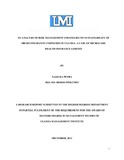| dc.contributor.author | NAJJUKA, Petra | |
| dc.contributor.author | Namanya, Anaclet Mutiba (supervisor) | |
| dc.date.accessioned | 2017-05-17T06:03:57Z | |
| dc.date.available | 2017-05-17T06:03:57Z | |
| dc.date.issued | 2011-12 | |
| dc.identifier.citation | APA | en_US |
| dc.identifier.other | 08/MMSPPM/17/053 | |
| dc.identifier.uri | http://hdl.handle.net/20.500.12305/116 | |
| dc.description | A Research Report Submitted to the Higher Degrees Department In Partial Fulfilment of the Requirement for the Award Of Master’s Degree in Management Studies of Uganda Management Institute | en_US |
| dc.description.abstract | This study aimed at establishing the impact of risk management strategies on sustainability of Micro insurance companies. Microcare Insurance Limited was used as the case study. The study was guided by four objectives and null hypotheses that focused on the risk management strategies and its impact on sustainability. The study consisted of one hundred eight respondents who were all staff members of which eighty eight members responded.
A cross-sectional research design was adopted in which both quantitative and qualitative techniques were employed. The data was collected using a self-administered questionnaire and interview guide. A review of relevant written documents was also done to supplement the primary data. The data collected was presented in frequency counts with varying percentages calculated. Interpretations and conclusions were made according to the number of occurrences on each item.
However, despite Microcare Health Insurance Limited’s efforts to integrate risk management strategies such as risk transfer, risk mitigation and risk avoidance fully into their organizational sustainability strategy, this insurance company faces many challenges such as lack of continuous training for staff, cash flow problems, policy pricing, client attrition, staffing problems, fraud and poor management information systems. The existence of such dimensional constraints makes organizational sustainability uncertain.
In light of the study findings, the researcher advanced recommendations such as following up on all the planned methods of mitigating the effect of risks, selecting appropriate control measures to each identified or foreseen risk, review and plan periodically in order to establish whether the previously selected measures are still applicable and understanding the business environment including knowledge of specific policies or failures that can affect the entire business. All these attach importance and call for concerted efforts of the government, non-governmental organizations and the general public to do everything possible that can bring about sustainable health insurance companies in Uganda | en_US |
| dc.language.iso | en | en_US |
| dc.publisher | Uganda Management Institute | en_US |
| dc.subject | Risk Management Strategies | en_US |
| dc.subject | Micro Insurance | en_US |
| dc.subject | Microcare Health Insurance | en_US |
| dc.title | An Analysis of Risk Management Strategies on Sustainability of Micro Insurance Companies in Uganda: A Case of Microcare Health Insurance Limited. | en_US |
| dc.type | Thesis | en_US |

